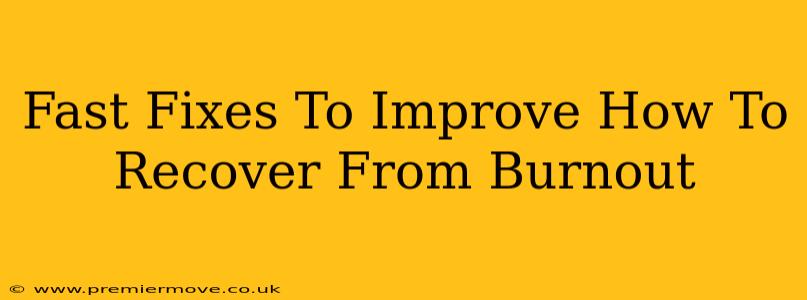Burnout. That sinking feeling of exhaustion, cynicism, and inefficacy. We've all been there, staring blankly at our screens, the energy completely drained. While true recovery takes time and intentional effort, there are some fast fixes you can implement immediately to start feeling a little better, a little faster. These aren't miracle cures, but they're crucial first steps on the road to regaining your vitality.
Immediate Actions: Quick Wins for Burnout Relief
Feeling overwhelmed? These steps can provide almost instant relief:
1. Step Away From the Screen: The Power of a Digital Detox
Seriously. Right now. Close your laptop, put down your phone, and walk away. The constant barrage of notifications and demands is a major contributor to burnout. Even 15 minutes of screen-free time can make a noticeable difference. Engage your senses: listen to the birds, feel the sun on your skin, notice the smells around you.
2. Breathe Deeply: The Instant Calming Effect
Deep, conscious breathing activates your parasympathetic nervous system, which helps calm your body down. Try box breathing: inhale for four seconds, hold for four, exhale for four, hold for four. Repeat several times. This simple technique can significantly reduce stress and anxiety in just minutes.
3. Hydrate and Nourish: Fueling Your Recovery
Dehydration exacerbates fatigue. Grab a big glass of water. Then, reach for a healthy snack—something with protein and complex carbohydrates for sustained energy. Avoid sugary treats; they'll provide a temporary boost followed by a crash.
Short-Term Strategies: Small Changes, Big Impact
These actions take a bit more time but are still relatively easy to implement and offer significant benefits for burnout recovery:
4. Gentle Movement: Releasing Tension
A brisk walk, some gentle stretching, or a short yoga session can work wonders. Physical activity releases endorphins, which have mood-boosting effects. Don't aim for a grueling workout; focus on gentle movement to ease tension and improve circulation.
5. Engage in a Relaxing Activity: Reconnect with Yourself
What do you enjoy? Listen to music, read a book, take a warm bath, or simply sit quietly and reflect. Allocate some time for activities that bring you joy and help you disconnect from work-related stress.
Longer-Term Strategies: Building a Sustainable Recovery Plan
These are essential for preventing future burnout episodes:
6. Re-evaluate Your Priorities: Setting Boundaries
Are you overcommitted? Learning to say "no" is crucial. Identify tasks that aren't essential and delegate or eliminate them. Set clear boundaries between work and personal life to protect your time and energy.
7. Seek Support: Don't Go It Alone
Talk to a friend, family member, or therapist. Sharing your struggles can be incredibly helpful. A supportive network can provide encouragement and practical advice during difficult times.
8. Prioritize Sleep: Rest and Recharge
Aim for 7-9 hours of quality sleep each night. Establish a regular sleep schedule, create a relaxing bedtime routine, and make sure your bedroom is dark, quiet, and cool.
Remember: Recovering from burnout is a journey, not a sprint. Be patient with yourself, celebrate small victories, and focus on building sustainable habits that support your well-being. These fast fixes are a starting point—use them to build momentum and create a healthier, more balanced life.

